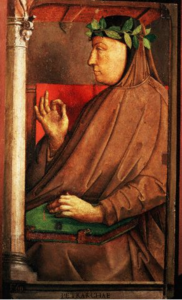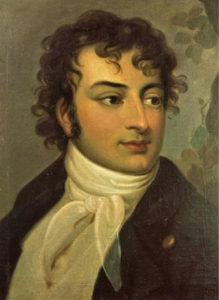Sonnet
(Poet's title: Sonett)
Set by Schubert:
D 629
[November 1818]
Allein, nachdenklich, wie gelähmt vom Krampfe,
Durchmess ich öde Felder, schleichend träge,
Und wend umher den Blick, zu fliehn die Wege,
Wo eine Menschenspur den Sand nur stampfe.
Nicht andre Schutzwehr find ich mir im Kampfe
Vor dem Erspähn des Volks in alle Wege,
Weil man im Tun, wo keine Freude rege,
Von außen lieset, wie ich innen dampfe.
So dass ich glaube jetzt, Berg und Gefilde
Und Fluss und Waldung weiß, aus welchen Stoffen
Mein Leben sei, das sich verhehlt jedweden.
Doch find’ ich nicht so rauhe Weg und wilde,
Dass nicht der Liebesgott mich stets getroffen
Und führt mit mir und ich mit ihm dann Reden.
Alone, reflecting, as if made lame by cramp,
I measure out barren fields, creeping sluggishly,
And I turn my gaze away in order to escape the paths
Where any trace of a human being has touched the sand.
I can find no other form of defence in the battle
Against people catching sight of me on all the paths,
Since from my actions, in which there is a lack of joy,
They can see from outside how I am boiling within.
So much so that I now believe the mountains and fields,
Rivers and woods all know what stuff
My life is made up of, though it is hidden from others.
Yet I have not found any path so uneven and wild
Where I have not always come across the god of love,
Who has then engaged me in conversation, and I with him.
All translations into English that appear on this website, unless otherwise stated, are by Malcolm Wren. You are free to use them on condition that you acknowledge Malcolm Wren as the translator and schubertsong.uk as the source. Unless otherwise stated, the comments and essays that appear after the texts and translations are by Malcolm Wren and are © Copyright.
☙
Themes and images in this text:
Amor / Cupid Appearance and reality Armour Being solitary, alone and lonely Fields and meadows Gazes, glimpses and glances Joy Paths Rivers (Fluß) Sand Mountains and cliffs Walking and wandering War, battles and fighting Woods – large woods and forests (Wald)
Petrarch’s poetry can be seen as an early form of Romanticism, so it is not surprising that he became popular again in early 19th century northern Europe. His attitude to the human condition and to the natural environment seems to prefigure many of the concerns which affected the generations who had to come to terms with the industrial revolution and the rise in urban living. The theme of avoiding other human beings and communing directly with nature (Petrarch famously was one of the first mountaineers – he climbed Mont Ventoux for the sheer fun of it) pervades the work of artists like Caspar David Friedrich and much of the poetry of the early 1800’s, but it is clearly also present in Petrarch. In a sonnet such as this one, he takes the classical Pastoral tradition and turns it into a more inward, psychological expression of anxiety. The speaker has not simply turned his back on the city to avoid the crowds and frustrations of communal living, he is determined to avoid any human contact whatsoever. Where a Pastoral poet such as Virgil expressed a longing to return to a simpler form of living along with the shepherds and the shepherdesses, there is no hint here in Petrarch that there is a golden age to which we can return or an Arcadia waiting to be inhabited.
For the speaker in this poem all of human interaction is a sort of battle. The hostile weapons are the looks and glances of other people judging him and finding him wanting; his only defence is to avoid their eyes and stick to the untrodden paths where there is less chance of encountering their gaze. In these remote places he can commune with mountains and fields, rivers and woods and ‘be himself’. Roaming about in such places at least soothes the agony of the tension between the facade he feels forced to present and the boiling (literally, ‘steaming’) inner life within. A hint of the nature of that broiling inner nature appears in the final tercet: wherever he walks he is in communion with Amor, the god of love. It is therefore some sort of erotic desire that is the source of his inner fire and at the same time the motivation for him to avoid other people. Eros does not drive him out to embrace the world (as in most love poetry) but engages him in conversation. The face to face interaction that he cannot have with others becomes possible with this most elusive of the gods.
☙
Schlegel’s translation adds a few extra phrases intensifying the emotion (e.g. seeing the encounter with others’ eyes as a ‘battle’), but is generally very faithful to the Italian original (below). He manages (impressively) to keep the same rhyme scheme: ABBA ABBA CDE CDE.
Solo e pensoso i più deserti campi
Vo mesurando a passi tardi e lenti;
E gli occhi porto per fuggire intenti
Ove vestigio uman l’arena stampi.
Altro schermo non trovo che mi scampi
Dal manifesto accorger de le genti;
Perchè negli atti d’allegrezza spenti
Di fuor si legge com’io dentro avampi.
Sì ch’io mi credo omai che monti et piagge
E fiumi e selve sappian di che tempre
Sia la mia vita, ch’è celata altrui.
Ma pur sì aspre vie nè sì selvagge
Cercar non so, ch’Amor non venga sempre
Ragionando con meco, et io co llui.
Rime In vita di Madonna Laura, 35
Alone and thoughtful, through the most desolate fields,
I go measuring out slow, hesitant paces,
and keep my eyes intent on fleeing any place
where human footsteps mark the sand.
I find no other defence to protect me
from other people’s open notice,
since in my aspect, whose joy is quenched,
they see from outside how I flame within.
So now I believe that mountains and river-banks
and rivers and forests know the quality
of my life, hidden from others.
Yet I find there is no path so wild or harsh
that love will not always come there
speaking with me, and I with him.
English translation from Italian © A. S. Kline 2002
☙
Original Spelling and note on the text Sonett. XI. Allein, nachdenklich, wie gelähmt vom Krampfe, Durchmess' ich öde Felder, schleichend träge, Und wend' umher den Blick, zu fliehn die Wege1, Wo eine Menschenspur den Sand nur stampfe. Nicht andre Schutzwehr find' ich mir im Kampfe Vor dem Erspähn des Volks in alle Wege, Weil man im Thun, wo keine Freude rege, Von außen lieset, wie ich innen dampfe. So daß ich glaube jetzt, Berg und Gefilde, Und Fluß und Waldung weiß, aus welchen Stoffen Mein Leben sey, das sich verhehlt jedweden. Doch find' ich nicht so rauhe Weg' und wilde, Daß nicht der Liebesgott mich stets getroffen, Und führt mit mir, und ich mit ihm dann Reden. 1 Schubert changed 'Stege' to 'Wege' (no essential change of meaning)
Confirmed with Francesco Petrarca, Il Canzoniere con le note di Giuseppe Rigutini, rifuse e di molto accresciute da Michele Scherillo. Terza edizione, rinnovata. Ulrico Hoepli, editore libraio della real casa, Milano, 1918, page 152; and with Le Rime di Francesco Petrarca secondo la revisione ultima del poeta a cura di Giuseppe Salvo Cozzo. In Firenze, G. C. Sansoni, editore. 1904, page 37.
To see an early edition of the text, go to page 22 [34 von 268] here:http://digital.onb.ac.at/OnbViewer/viewer.faces?doc=ABO_%2BZ167383408



